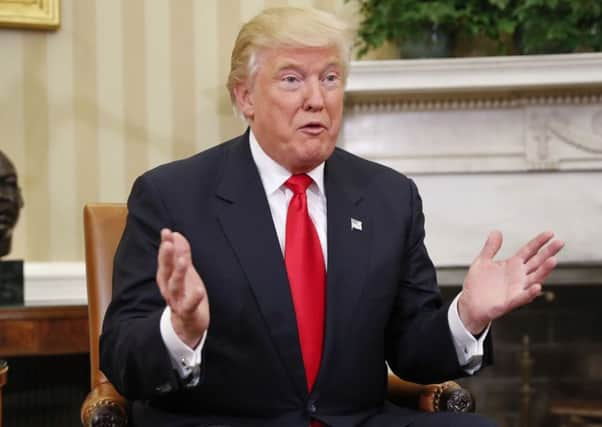Stewart Arnold: Blue-collar anger burns deeply in Yorkshire too


Notwithstanding the damage it does to many in the profession of politics, are there lessons we can learn from Donald Trump’s extraordinary victory especially with respect to Yorkshire?
First and foremost, blue-collar anger and resentment across America’s so called ‘rust belt’ was a big factor in helping Donald Trump win. Just as in Yorkshire, many American states have seen their manufacturing sector shrink within the space of a generation. In Yorkshire, those well-paid jobs in the textile factories or in the mines or in the steel mills or on the trawlers have been replaced by low-paid jobs in warehouses and call centres. Like America, where unemployment rates are significantly higher than average in former manufacturing cities such as Detroit and Chicago, Yorkshire’s jobless rates are greater than those in London and the South East. Communities, where key industries have disappeared, have been hard hit. It is why parts of Yorkshire undoubtedly share the same pain and anger as their American cousins.
Advertisement
Hide AdAdvertisement
Hide AdSuccessive Labour and Conservative governments have only in part recognised this resentment. George Osborne’s Northern Powerhouse is the latest in a long line of initiatives stretching back 40 years where governments tried to bring about economic growth. All have ended in failure ultimately, as real decision making power has always remained outside the region.
What Yorkshire needs is more much control over its economic wellbeing. It needs the tools to create more balanced growth, including maintaining a stronger role for manufacturing. In short, it needs an industrial strategy: a strategy that would tackle chronic weaknesses in the Yorkshire economy and set the path to a strong sustainable future.
I see it being drawn up within the region in a partnership between businesses, trade unions, experts and others. As part of this strategy, Yorkshire needs a voice at the table when it come to Brexit talks. Just as the City of London financial sector is making demands of our Brexit Ministers for special treatment, so, too, should our manufacturing sector. There should be nothing that Brexit does that should diminish Yorkshire’s manufacturing base. However, there needs to be more than that.
An industrial strategy for Yorkshire needs to argue for more funding for priority areas of infrastructure – not least transport – and especially connectivity both within our region and beyond. So, for example, let’s improve rail infrastructure in the North before committing to a high- speed link from London.
Advertisement
Hide AdAdvertisement
Hide AdWe need a regional bank providing funding to consumers and small and medium-sized businesses. We need greater research and development spending in Yorkshire (at present our share is a tiny fraction of what is spent in the UK overall). We should promote a ‘Made in Yorkshire’ label starting with our food and drink and quality textile and fashion sectors.
And above all, we must work, jointly, to improve our educational attainment across Yorkshire. So, although the Yorkshire Party believes it is fundamentally wrong that a pupil in the City of London enjoys over £4,000 per year in funding than a pupil in York, funding is only part of the problem. Education requires real regional political focus. London’s failing schools were turned around by the London challenge – a regional approach across all of London that transformed the life chances of children. Yorkshire needs the same.
The second significant thing we take from Donald Trump’s victory is the suspicion of elites. We, in Yorkshire, can match the distrust the ordinary American voter has of Washington. In our case a suspicion of London, which as a capital city sucks the life blood out of the regions of England, not least the tens of thousands of graduates our universities turn out each year. A distrust which is further magnified by refusing an inquiry into the events at Ogreave and by the woeful imbalance on spending between the north and south on flood defences. And, meanwhile, in the background, both national and local elites conspire to impose the unloved and unwanted City Regions on the people.
Donald Trump did not appear hugely likeable as an individual but, as he was seen to be outside the political establishment, he did give hope to many who felt forgotten, especially in those communities hardest hit economically. And it worked for him. The parallels with Yorkshire, in my view, are more than superficial. We could do no worse than give people hope.
• Stewart Arnold is the leader of the Yorkshire Party.